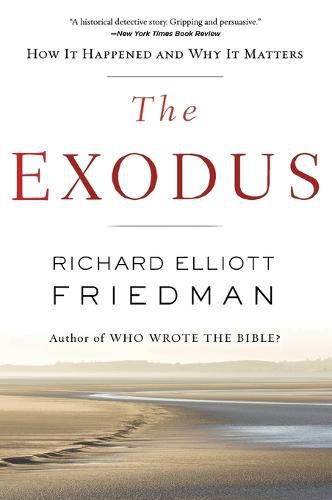Readings Newsletter
Become a Readings Member to make your shopping experience even easier.
Sign in or sign up for free!
You’re not far away from qualifying for FREE standard shipping within Australia
You’ve qualified for FREE standard shipping within Australia
The cart is loading…






This title is printed to order. This book may have been self-published. If so, we cannot guarantee the quality of the content. In the main most books will have gone through the editing process however some may not. We therefore suggest that you be aware of this before ordering this book. If in doubt check either the author or publisher’s details as we are unable to accept any returns unless they are faulty. Please contact us if you have any questions.
The Exodus has become a core tradition of Western civilization. Millions read it, retell it, and celebrate it. But did it happen?
Biblical scholars, Egyptologists, archaeologists, historians, literary scholars, anthropologists, and filmmakers are drawn to it. Unable to find physical evidence until now, many archaeologists and scholars claim this mass migration is just a story, not history. Others oppose this conclusion, defending the biblical account.
Like a detective on an intricate case no one has yet solved, pioneering Bible scholar and bestselling author of Who Wrote the Bible? Richard Elliott Friedman cuts through the noise – the serious studies and the wild theories – merging new findings with new insight. From a spectrum of disciplines, state-of-the-art archeological breakthroughs, and fresh discoveries within scripture, he brings real evidence of a historical basis for the exodus – the history behind the story. The biblical account of millions fleeing Egypt may be an exaggeration, but the exodus itself is not a myth.
Friedman does not stop there. Known for his ability to make Bible scholarship accessible to readers, Friedman proceeds to reveal how much is at stake when we explore the historicity of the exodus. The implications, he writes, are monumental. We learn that it became the starting-point of the formation of monotheism, the defining concept of Judaism, Christianity, and Islam. Moreover, we learn that it precipitated the foundational ethic of loving one’s neighbors – including strangers – as oneself. He concludes, the actual exodus was the cradle of global values of compassion and equal rights today.
$9.00 standard shipping within Australia
FREE standard shipping within Australia for orders over $100.00
Express & International shipping calculated at checkout
This title is printed to order. This book may have been self-published. If so, we cannot guarantee the quality of the content. In the main most books will have gone through the editing process however some may not. We therefore suggest that you be aware of this before ordering this book. If in doubt check either the author or publisher’s details as we are unable to accept any returns unless they are faulty. Please contact us if you have any questions.
The Exodus has become a core tradition of Western civilization. Millions read it, retell it, and celebrate it. But did it happen?
Biblical scholars, Egyptologists, archaeologists, historians, literary scholars, anthropologists, and filmmakers are drawn to it. Unable to find physical evidence until now, many archaeologists and scholars claim this mass migration is just a story, not history. Others oppose this conclusion, defending the biblical account.
Like a detective on an intricate case no one has yet solved, pioneering Bible scholar and bestselling author of Who Wrote the Bible? Richard Elliott Friedman cuts through the noise – the serious studies and the wild theories – merging new findings with new insight. From a spectrum of disciplines, state-of-the-art archeological breakthroughs, and fresh discoveries within scripture, he brings real evidence of a historical basis for the exodus – the history behind the story. The biblical account of millions fleeing Egypt may be an exaggeration, but the exodus itself is not a myth.
Friedman does not stop there. Known for his ability to make Bible scholarship accessible to readers, Friedman proceeds to reveal how much is at stake when we explore the historicity of the exodus. The implications, he writes, are monumental. We learn that it became the starting-point of the formation of monotheism, the defining concept of Judaism, Christianity, and Islam. Moreover, we learn that it precipitated the foundational ethic of loving one’s neighbors – including strangers – as oneself. He concludes, the actual exodus was the cradle of global values of compassion and equal rights today.